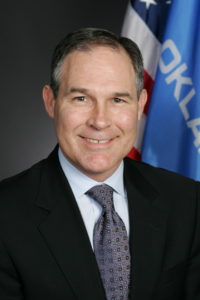 Tomorrow the Supreme Court of the Unites States will consider an appeal by the state of Virginia on its ban on out of state petitioners. [UPDATE: The Supreme Court refused to take up the case (PDF). This means that the lower court ruling overturning the ban remains in place in Virginia and all other jurisdictions that have had such bans overturned.] This ban was challenged by the Libertarian Party of Virginia and the law banning the petitioners was overthrown by the Fourth Circuit Court.
Tomorrow the Supreme Court of the Unites States will consider an appeal by the state of Virginia on its ban on out of state petitioners. [UPDATE: The Supreme Court refused to take up the case (PDF). This means that the lower court ruling overturning the ban remains in place in Virginia and all other jurisdictions that have had such bans overturned.] This ban was challenged by the Libertarian Party of Virginia and the law banning the petitioners was overthrown by the Fourth Circuit Court.
Oklahoma had a similar law in effect, but its law was overturned and a repeal was forced. This was unfortunate for many in power in Oklahoma and specifically for Oklahoma Attorney General Scott Pruitt. Because of this, AG Scott Pruitt has filed an amicus brief in the Virginia case along with six other states asking the Supreme Court to uphold the ban on out of state petitioners.
If the Supreme Court upholds the ban, it would have the ramifications of making it far harder for alternative parties and citizens seeking to field a ballot question to fellow voters. If the law is overturned by the Supreme Court then Pruitt argues that the remedies left to the states to prevent fraud would be severely hampered. (PDF)
The States of Oklahoma, Hawaii, Idaho, Nebraska, Ohio, South Dakota and Wyoming as amici have an interest in the outcome of Charles Judd, et al. v. Libertarian Party of Virginia and Darryl Bonner because the States are vested with the responsibility for ensuring that ballot access, both in terms of initiative petitions and candidate petitions, are shielded from fraudulent behavior and that the integrity of these initiatives is preserved. To ensure these twin aims are met, many States have instituted residency requirements. Yet, despite recognizing that these interests are compelling, a number of courts have nevertheless declared residency requirements insufficiently narrowly tailored to these compelling interests, and have therefore ruled that residency requirements unconstitutionally infringe on circulators’ First Amendment rights. These courts have based their determinations on an exaggerated reading of this Court’s precedents, leaving States with a few, ineffectual means of combating the harms toward which residency requirements are aimed. The amici urge this Court to accept review in this case.
Part of Pruitt’s concern is that the electoral and petition process will be usurped by out of state interests. His concern is that single issue campaigns will come in and change laws and the constitution without having to deal with the fall out.
Nevertheless, “a major fear of citizens in states with ballot initiatives is that out-of-state special interest groups will come into their state and change the political climate by enacting laws and altering constitutions while avoiding any of the negative effects such changes could create.” Therefore, the integrity of the initiative is integral to continued direct democracy within the State. The same is true for candidate petitions.
However, we can look back at recent elections to see that Pruitt’s stated fears have no merit. In 2010, the only citizen petition to be granted a ballot question was SQ744 which would have changed the way the state funds education. This question was highly criticized as being funded and pushed by the national teachers unions. Despite the strong national support from a strong union, the question failed to pass a vote of the people. This situation shows that even if a national interest groups successfully gets a question on the ballot, it would still need to garner state support to pass. If the people of the state are not interested in the national interest, then it would certainly not be harmed by the allowance of out of state petitioners.
Pruitt also closes that statement by saying that candidate petitions are also at danger of such national meddling. Yet, Pruitt fails to understand Oklahoma’s current candidacy climate. Oklahoma has a system in which independent candidates can pay a fee rather than circulate a petition. In fact, the only line on the ballot that does not include a fee instead of a petition is that of President. Considering the national importance of the Presidency, it would make sense to leave the petitioning for President open for national parties and groups to fund the petition process.
Of course, if Pruitt really wants to weaken national interests in the state, perhaps the better plan of action is to strengthen the citizens in the state. The process for forming a new party is extremely burdensome without the support of national parties. If the process were easier for those in the state, they would be less reliant on out of state petitioners. The same goes for the initiative petition process. With requirements of 8% of the last statewide vote for proposed laws and 15% for constitutional amendments, the process could be made easier for the citizenry. The same could be done with the formation of new parties which require a petition of 5% of the last statewide election. If the citizens had greater access to the ballot, then the power of out of state interests would be weakened dramatically.
for more information: Judd vs Libertarian Party of Virginia


